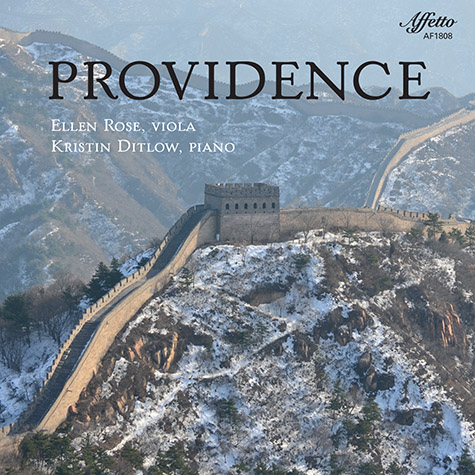The germ of the concept of this album for Ellen Rose, the recently retired first chair violist of the Dallas Symphony, and Kristin Ditlow, conductor, pianist extraordinaire and vocal coach, came due to a musician-colleague’s invitation to the duo to perform during the 2012-2013 season at the National Theater in Kunming, China (Yunnan Province), and the multi-city tour formed around that. The three-week tour of Beijing, Shanghai, and Kunming became the framework represented by this duo’s debut disc name, Providence. What followed immediately was the weaving together of three continents and years of planning out of the repertoire of that tour.
Boccherini’s Sonata No. 6 in A Major is representative of the composer’s bringing violincello writing into more melodic and virtuosic milieu, here represented so wonderfully by a viola. Vaughan Williams’ Romance is among several pieces discovered after the composer had passed away in 1958, but thought to have been composed in 1914. “Whither Must I Wander,” originally for piano and baritone from his song cycle Songs of Travel, was arranged for the duo on this album by Ellen Rose and Kristin Ditlow, and is therefore a premiere recording. Enescu’s Concertstück is a combination of his native Romania and Paris where he lived much of his life, with traces of Debussy and French impressionists and the theme from a lively Romanian folk dance. Messiaen’s “Louange,” composed in a French prison in 1941 for a quartet of musician prisoners, uses religious quotes or motives as well as bird calls, Messiaen being both a devout Catholic and an enthusaistic ornitholgist. Rebecca Clarke’s Sonata was the largest work on the China tour, her best-known work, and was written for a 1919 competition, in which she tied Ernest Bloch for first place with its combination of whole tone, octatonic and pentatonic scales as well as piano and string writing which shows great admiration for Debussy.
Ending the album with a Puccini aria from Tosca coincides with using this piece as the encore from the China tour, an aria which has, as its sung last line, “I lived for art, I lived for love, I’ve never harmed a living soul!” There is no doubt that this album musically soothes and excites the soul with a vast combination of exquisite musical textures and stunning performances!





